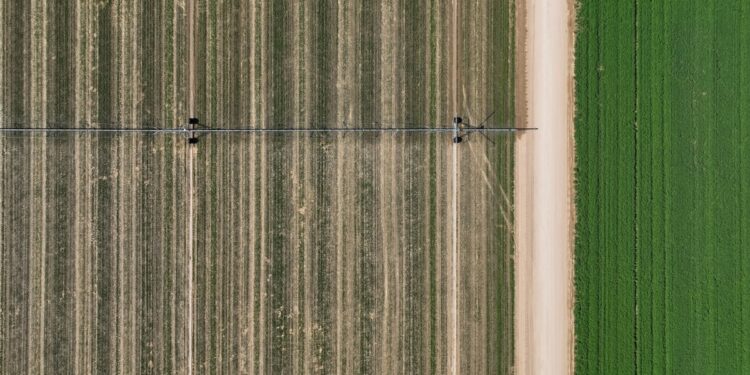Arizona’s attorney general has sued a Saudi-owned farm operating a massive hay operation in the middle of the Arizona desert, alleging that the business is hastening the loss of the rural community’s rapidly depleting groundwater supply.
The farm owned by Fondomonte uses billions of gallons of groundwater in La Paz County each year to irrigate the desert to grow hay, which it then ships back to the Middle East to feed dairy cows.
The Saudi-owned operation first came to light in a 2015 investigation by the Center for Investigative Reporting and quickly sparked outrage in the state, spurring national and even international media coverage.
Arizona Attorney General Kris Mayes told CIR last year that she was considering suing to stop the damage. On Wednesday, she announced the public nuisance lawsuit. It asks a judge to stop Fondomonte from excessive pumping and require the company to establish an abatement fund, which would cover damages incurred by neighbors such as their wells going dry or their water quality worsening as the groundwater is depleted.
“Arizona law is clear: no company has the right to endanger an entire community’s health and safety for its own gain,” Mayes said in a statement.
Arizona Department of Water Resources director Tom Buschatzke initially said that CIR’s 2015 investigation was making “hay” and overblowing the issue, writing in the Arizona Republic that “there is a sufficient water supply available in this area of La Paz County for at least the next 100 years.”
But domestic wells of neighbors around Fondomonte soon began to go dry. The farm and its neighbors were profiled in the film The Grab, a feature-length documentary about global food and water conflicts, reported and produced by The Center for Investigative Reporting.
In 2017, the well at the Friendship Baptist Church located next to the farm went dry, requiring the pastor to truck in bottled water for baptismals and other events. John Weisser, a rancher near the Saudi farm, told the filmmaking team his well went dry, too, “because the water’s dropping. There’s not enough rain that could replenish it.”
Wayne Wade, who lived in a trailer park near the farm, reported the same problem.
“The water level went below my pump and the pump burned up and melted the casing,” Wade said. “I think everybody knows the problem, but I don’t know how to correct it. I can’t pay for a high-powered lawyer. Neither can any of my friends.”
La Paz County Supervisor Holly Irwin has been asking for help since news of the Saudi-owned farm first broke nearly ten years ago. Now that the state’s attorney general has stepped in, “I feel that La Paz County finally has someone fighting for us,” Irwin said. “My constituents are experiencing real damages from massive groundwater pumping.”
Mayes, who was elected in 2022, said that allowing Fondomonte and other mega farms in rural Arizona to pump unlimited amounts of water at no cost beyond the electricity bills they pay to operate the wells has been a failure of the state government.
“Why are we allowing a Saudi owned corporation to stick a straw in the ground and suck so much of our water out and send alfalfa back to Saudi Arabia and not charge them a dime for the water? It is bonkers,” Mayes told Reveal last year. “Water in Arizona is life. Our very survival as a state depends on our doing better when it comes to water.”
In the mid-1990s, Saudi Arabia was the world’s sixth-largest exporter of wheat. But as their groundwater was drained down, the government told companies to go overseas in search of new water supplies.
“Fondomonte came to Arizona to extract water at an unreasonable and excessive rate because doing so was banned in its home country – another arid desert with limited water,” the lawsuit alleges. “Fondomonte is taking advantage of Arizona’s failure to protect its precious groundwater resource.”
Fondomonte said in a statement that the allegations are “totally unfounded.”
“We will defend any potential action against Fontomonte and our rights vigorously before the competent authorities,” the statement said.







